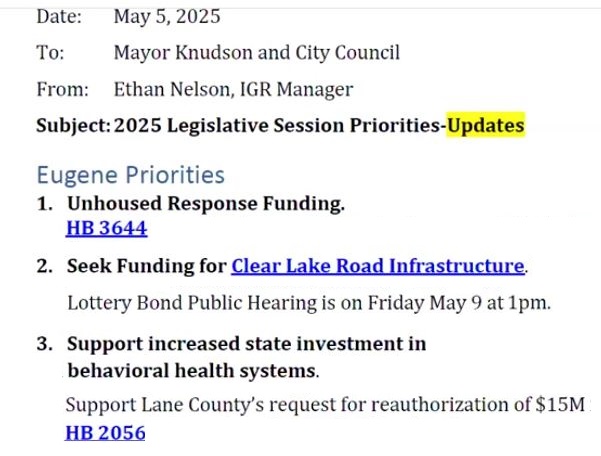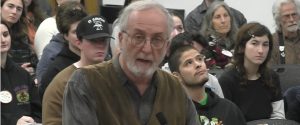City faces tough competition for funding at legislature
5 min read
Presenter: Will the legislature help fund Eugene’s unhoused response? It’s the city’s top priority. With the Intergovernmental Relations Committee May 7, IGR Manager Ethan Nelson:
Ethan Nelson (IGR, manager): House Bill 3644 is the vehicle for that. And in the Governor’s Recommended Budget (GRB), there was a $217 million request for shelter and that would fund all of the state-funded shelters from the previous couple of years.
[00:00:26] And so Oregon Housing & Community Services did a big survey. They pulled together statewide data to say, ‘Okay, what are the shelters that we’re funding? How many beds?’ and ‘What’s that cost?’
[00:00:37] We know for sure that all of the beds in Oregon are not included in that OHCS survey. So there’s a gap between what is that $217 million and what ostensibly is required across the state to maintain the beds that are out there.
[00:00:55] So many of us in the shelter advocacy world, in the cities, have been really stating that $217 (million) is the floor for what should be allocated. There’s more requests than there is going to be money.
So we’re just kind of facing that. And we’ll see when the final budget gets produced in June what that number is. But until that, it’s kind of behind-closed-doors negotiations at this point.
[00:01:24] Presenter: The second priority is to support business growth in Northwest Eugene. Ethan Nelson:
[00:01:29] Ethan Nelson (IGR, manager): Clear Lake Road infrastructure, so: We’re getting closer and the landscape of regional capital funding requests are known and they’re starting to be prioritized. Where do we fit on the priority list for the delegation? And then, ostensibly, who is going to be carrying this, is their take-home. And so, still working on that.
[00:01:48] I think that we will be successful in getting it as a priority. I think that our ask of $10.5 million is pretty high, given how they’ve funded in the past. But we’ve also asked for $3 million of that to Congresswoman Hoyle through her congressionally-directed spending, the earmark process, but that’s going to be in the next fiscal year. And this last year, the Congress didn’t add earrmarks to the budget. So if they do and this project is successful, then we’ll have federal dollars that could be added to the project.
[00:02:18] Presenter: Mayor Kaarin Knudson:
[00:02:20] Kaarin Knudson (Eugene, mayor): The materials that we’ve shared with our federal partners and state partners around this priority as it relates to economic development does break out some different phases of work. And I think the advocacy has been very clear, that there’s a lot of partnership and potentially some really great opportunity and urgency attached to this funding coming forwards in the near term.
And it’s not just those dollars, but actually other dollars that could be matched, and then also and then added to with other new investment. That is part of what, you know, keeps this as a current conversation in every lobbying and advocacy conversation that we’ve had over this last several months.
[00:03:01] So I just wanted to reiterate that and that we’ll continue to do everything we possibly can to push this priority. We have a lot of stakeholders who are also invested and actively advocating in support and in partnership. And it’s a multiyear process, but among many competing funding asks right now.
[00:03:23] Ethan Nelson (IGR, manager): Thank you, Mayor, I appreciate you interjecting on that. And it brings on up another important piece. So this is the Eugene Chamber (of Commerce)’s number one priority, their policy priority for this legislative session.
And we were actually, so they were up, I think it was two weeks ago, Brittany Quick-Warner and Tiffany Edwards from the Chamber were up with a delegation of some Chamber board members identifying this as a collaborative project between or priority between the city of Eugene and the Chamber. And then at the end of last week, Brittany and Tiffany and I, we all met and worked through strategy. And so it’s not just myself.
[00:04:04] So we’re doing what we can to encourage that this is a priority, quality project and that it will have long-term repercussions, benefit for the community.
[00:04:17] Presenter: The city’s number three priority is to support Lane County’s requests for the behavioral health stabilization center and funding in HB 2056. Ethan Nelson:
[00:04:28] Ethan Nelson (IGR, manager): This would be funding for community health programs, mobile crisis response, civil commitment process. Those funds likely wouldn’t come to the city of Eugene directly, but they would impact our community because they’re funds that Lane County utilize for their community health programs, for their mobile crisis response program, and also any of the civil commitment pieces that through the District Attorney’s Office and Lane County Circuit Court, which interfaces with Municipal Court.
[00:05:02] So we want that one to get pushed through too. So back to what I was saying at the beginning, there’s a lot of requests to tight budget year. We do know that Lane County is in the rebalancing bill. They were unsuccessful to get the funds that had been previously allocated for projects in Lane County, specifically around there was about $7.5 million for the multipurpose event center, and that was not included as a rebalancing.
[00:05:30] And so they’re coming back into the capital construction process, and so they will also be making a request. They’ve been working with the delegation to prioritize that. And there’s good momentum for this to be a priority.
[00:05:46] Presenter: The committee also heard about a long-term solution to the city’s budget struggles: property tax reform. Ethan Nelson:
[00:05:54] Ethan Nelson (IGR, manager): We, LOC (League of Oregon Cities), city of Eugene, AOC (Association of Oregon Counties), we’re all working with Rep. Nathanson on this House Bill 2333 as kind of the vehicle. There’s another bill, that might get changed, but Rep. Nathanson is supportive.
[00:06:09] We’re trying to get everybody committed to push a bill on out that’s going to be a work session to focus in over in the interim on property tax impacts to the local governments and come up with some solutions.
[00:06:23] So we’re really, like, ‘We need to lay down the groundwork for that,’ so that during the interim, it’s a very serious concerted effort and LOC is engaged and they’re also looking to potentially utilize some of their reserves to fund that effort as well in concert with the legislature. So we’re moving forward on that one.
[00:06:49] Presenter: Local officials explain the community’s urgent needs, as the legislature moves into the final third of a session that began Jan. 21 and must end, according to the Oregon Constitution, by June 29.




